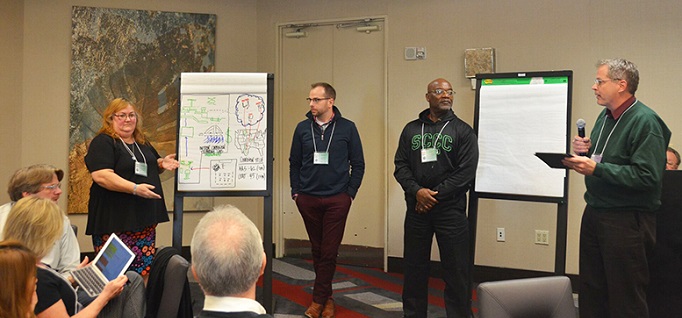Making valuable connections
By Madeline Patton
February 14, 2018
Mentor-Connect helps colleges fine-tune their proposals.
Great teams know that having a seasoned coach can help them win.
That’s the basic idea behind Mentor-Connect, a National Science Foundation (NSF)-funded grant-writing and leadership development initiative. To help navigate NSF’s proposal requirements for its Advanced Technological Education (ATE) program, Mentor-Connect provides each college team with a mentor for nine months and a plethora of digital grant-writing resources.
This month, faculty, administrators and grant writers from 21 two-year colleges attended a Mentor-Connect’s technical assistance workshop in Fort Lauderdale, Florida, for hands-on training on how best to apply for ATE grants. The ATE program focuses on improving the quality of technicians in advanced technology fields, and it represents NSF’s largest investment in two-year colleges
The American Association of Community Colleges partners with the South Carolina ATE Center of Excellence on Mentor-Connect.
High-powered plans
The 21 mentee colleges for 2018 are Mentor-Connect’s sixth cohort and include for the first time a college from Puerto Rico; a Bellwether-award-winning college; and a college involved in Science Foundation Arizona’s Kickstarter project for Hispanic-serving institutions.
Johnston Community College (JCC) in North Carolina hopes to build on its One College model—for which it received the 2018 Bellwether Award in January — in the ATE grant proposal it plans to submit in October. Its Mentor-Connect team includes two faculty members, the college’s grant writer and the executive director of the college’s foundation.
To prepare for their conversations with industry partners and colleagues about their plans, JCC’s team members worked with mentor Elaine Johnson, principal investigator of the ATE-funded Bio-Link center, at the workshop to craft a two-minute “elevator speech” about their ideas for integrating cross-discipline skills in biotechnology and industrial maintenance. The two programs are taught on different JCC campuses, and the two faculty members on the Mentor-Connect team want to work together to create curricula that addresses the needs of two biotech companies with big expansion plans near the rural college.
Leslie Isenhour Holston, JCC biotechnology instructor, said biotech employers have told her they want to hire biotechnicians who can troubleshoot and resolve basic production issues. Referring to Brian E. Worley, director of advanced technology programs, who was seated at the conference table with her, she said, “His maintenance technicians would have a stronger resume and stronger skill set if they understood the life science piece, because everything they do is mission critical.”
Tweaking ideas
While JCC has obvious industry partners for its ATE proposal, the team for Phoenix College in Arizona was strategizing about how to gather input from the many finance, retail, and healthcare employers near its campus.
“We want to develop something that meets the needs of the main downtown Phoenix community,” said Nick Rouse, director of computer information systems. At the workshop, he and faculty member Greg Simpson developed a plan for a cybersecurity project that was a bit different from what they had initially envisioned.
“After this conference, things have changed because we learned so much more,” Simpson said, praising their mentor Mel Cossette, executive director of the ATE-funded National Resource Center for Materials Technology Education, for directing them to helpful websites, industry contacts and other ATE centers for information.
Many of the resources — checklists, webinars, budget tutorials, Q & As — that Mentor-Connect has created for its mentees are freely accessible through its online library.
Phoenix College has participated in SFAz’s KickStarter program, which also receives ATE grant support. KickStarter guides faculty and staff at two-year Hispanic-serving institutions through an intensive, comprehensive technical assistance process that positions them “to compete successfully for federal funds focused on student recruitment and retention in STEM fields.”
Phoenix College is the pilot test for the collaboration between Mentor-Connect and SFAz.
Anita Grierson, an SFAz program officer for Community College STEM Pathways, lauded the Mentor-Connect’s experience, resources and support network within ATE. The enthusiasm and dedication of Phoenix College faculty made it a good fit for Mentor-Connect, she said.
“When we have a college that has been through our STEM planning and has a concept that they want to develop that’s appropriate for ATE, having them come into this support network I think it only strengthens that college and their ability … to sustain [their project] because of all the training, the strength, and the support of this community,” Grierson said.
There’s more to the story! Read the full article in CC Daily.



